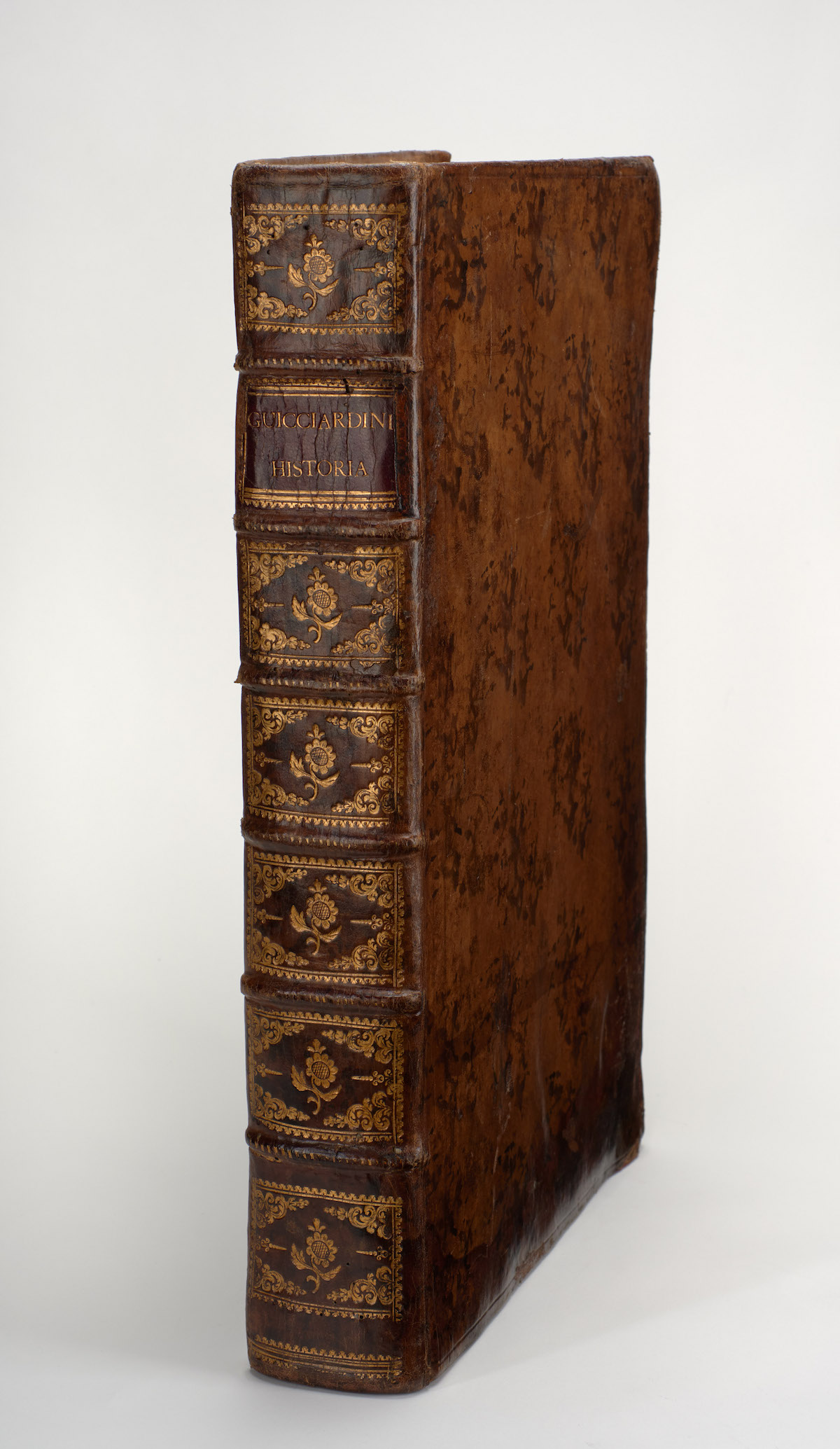landmark of Renaisssance thought and history
GUICCIARDINI, FRANCESCO. La Historia di Italia
Florence: Lorenzo Torrentino, 1561
Folio. (viii), 665 (i.e. 657), (1) pp, complete including the final leaf with the Medici arms. Eighteenth-century mottled calf, spine gilt. Washed. First quire reinserted, several leaves restored including lower corner of first few leaves and upper corner of last leaf. A handsome, wide-margined copy.
FIRST EDITION. A “masterpiece of scientific history,” Guicciardini’s History of Italy was “undoubtedly the greatest historical work that had appeared since the beginning of the modern era. It remains the most solid monument of Italian reason in the 16th century, the final triumph of that Florentine school of philosophical historians which included Machiavelli …” (Britannica, 11th ed.).
Born in Florence, Francesco Guicciardini’s colleagues and contemporaries included Niccolò Machiavelli, Girolamo Savonarola, Lorenzo the Magnificent, and popes Leo X, Clement VII, and Paul III. Oliver Goldsmith wrote of him: “He was at once (what seldom happens to be united in the same person) a scholar, a soldier, and a politician.” This lent him a unique perspective on the history of the powerful nation-state of Florence and the role of Italy in Europe at the turning of the sixteenth century. The Historia d’Italia was the first to discuss the Italian peninsula as a unified entity among the other nation-states in Europe.
“The whole tangled skein Italian politics of an involved and stormy period is unravelled with patience and insight. The author is an impartial spectator, a cold and curious critic. This want of feeling impairs the interest of his history. He does not seem to be aware that he is writing a great historical tragedy from his own times. He takes as much pains on a petty war with Pisa as in probing the papacy. Whatever he touches, lies already dead on the dissecting table. He fails to understand the vigour of the forces contending in Europe for mastery; this is very noticeable in what he writes about the Reformation. The Storia d’Italia was still undoubtedly the greatest historical work that had appeared in the early modern era” (Britannica, 11th ed.).
In his celebrated Historia, “the first history of Europe” (PMM), Francesco Guicciardini demonstrated the interdependence of political events across the continent, ushering in a new age of political and historical scholarship. “He was less interested in the facts themselves … than in their causes and effects; these he discussed with the perspicacity of a Renaissance politician and diplomatist, dissecting the intentions and actions of the chief players on the European stage and proving … that worldly passion, ambition, and self-interest are the mainspring of human activity” (Printing and the Mind of Man).
The Historia covers the tumultuous years 1494 (the death of Lorenzo de Medici) to 1532 (the death of Clement VII). This period also produced Guicciardini’s friend Machiavelli, with whom he is often compared as a political thinker. “The father of modern history,” Guicciardini (1483-1540) played a central role in the political events of his day as advisor and confidant to three popes, governor of several Italian states, ambassador, administrator, military leader, advisor to the Medicis, and close friend of Machiavelli. In 1537 he retired to his villa to write a history of his times. La Historia di Italia was published posthumously in 1561. “Guicciardini reminds us of Thucydides, a historian equally involved in the events he narrates and equally absent from his own narrative” (Mark Phillips, Francesco Guicciardini: The Historian’s Language, p. 178).
Voltaire said of Guicciardini and his history: “Italy found its Thucydides in Guicciardini, or rather its Xenophon, for he often commanded troops himself in the wars he recounts.” Part of his expansive career was spent as the lieutenant general of Clement VII’s papal armies during the Sack of Rome, and his knowledge of the events as they transpired is undisputed.
L’Historia d’Italia strongly reflects the experience Guicciardini had while working under several popes and the anti-clerical tone that resulted. Several parts of this original 1561 edition were censored for their anti-papist sentiment and therefore this volume contains but 16 of the 20 books. These censored passages found their way into circulation “by Protestant publicists as showing a dissolute and power-hungry papacy” (Moulakis, 33).
The reception of the Historia in its time was extraordinary. Within 20 years, it was translated into French and then English and recognized throughout Europe as a vital part of any scholar’s library. The English translation was dedicated to Queen Elizabeth. Even today, it is recognized as “the basis of all later works on the beginning of modern history” (von Ranke). By 1600, it was available in at least six translations and had been reprinted, with some additions, ten times.
A favorite of Michel de Montaigne and praised by Justus Lipsius, Guicciardini “has generally held the first place among Italian historians…” (Hallam 345). Wrote Guicciardini: “[P]ast events throw light upon the future, because the world has always been the same as it now is, and all that is now, or shall be hereafter, has been in times past. Things accordingly repeat themselves …”
A fine copy of a book now scarce in private hands, l’Historia d’Italia is one of the greatest Italian works of the 16th century, and its author is among the two dozen “Great Florentines” depicted in statues outside the Uffizi in Florence.
Examples in collector’s condition are rare in the market.
Printing and the Mind of Man 85.
$28,000



